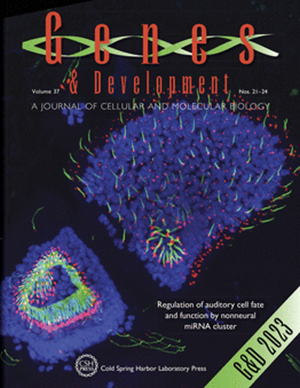类固醇激素 ADIOL 通过降低神经的犬尿氨酸水平来促进学习
IF 7.5
1区 生物学
Q1 CELL BIOLOGY
引用次数: 0
摘要
犬尿氨酸是一种神经抑制性代谢物,降低脑内犬尿氨酸水平可改善多种生物的认知功能。因此,调节犬尿氨酸水平被认为对一系列脑部疾病具有治疗潜力。在这里,我们报告了类固醇 5-雄烯 3β,17β-二醇(ADIOL)可降低犬尿酸水平,并促进秀丽隐杆线虫的联想学习。我们确定了 ADIOL 将外周代谢途径与学习能力神经机制联系起来的分子机制。此外,我们还发现,在通常认知能力会迅速下降的老年动物中,ADIOL 可提高学习能力。ADIOL的生物合成及其促进犬尿酸还原的分子机制在哺乳动物中是保守的。因此,ADIOL不是性类固醇生产过程中的一个次要中间体,而是一种内源性激素,它通过降低神经的犬尿酸水平来有效调节学习能力。本文章由计算机程序翻译,如有差异,请以英文原文为准。
The steroid hormone ADIOL promotes learning by reducing neural kynurenic acid levels
Reductions in brain kynurenic acid levels, a neuroinhibitory metabolite, improve cognitive function in diverse organisms. Thus, modulation of kynurenic acid levels is thought to have therapeutic potential in a range of brain disorders. Here we report that the steroid 5-androstene 3β, 17β-diol (ADIOL) reduces kynurenic acid levels and promotes associative learning in Caenorhabditis elegans. We identify the molecular mechanisms through which ADIOL links peripheral metabolic pathways to neural mechanisms of learning capacity. Moreover, we show that in aged animals, which normally experience rapid cognitive decline, ADIOL improves learning capacity. The molecular mechanisms that underlie the biosynthesis of ADIOL as well as those through which it promotes kynurenic acid reduction are conserved in mammals. Thus, rather than a minor intermediate in the production of sex steroids, ADIOL is an endogenous hormone that potently regulates learning capacity by causing reductions in neural kynurenic acid levels.
求助全文
通过发布文献求助,成功后即可免费获取论文全文。
去求助
来源期刊

Genes & development
生物-发育生物学
CiteScore
17.50
自引率
1.90%
发文量
71
审稿时长
3-6 weeks
期刊介绍:
Genes & Development is a research journal published in association with The Genetics Society. It publishes high-quality research papers in the areas of molecular biology, molecular genetics, and related fields. The journal features various research formats including Research papers, short Research Communications, and Resource/Methodology papers.
Genes & Development has gained recognition and is considered as one of the Top Five Research Journals in the field of Molecular Biology and Genetics. It has an impressive Impact Factor of 12.89. The journal is ranked #2 among Developmental Biology research journals, #5 in Genetics and Heredity, and is among the Top 20 in Cell Biology (according to ISI Journal Citation Reports®, 2021).
 求助内容:
求助内容: 应助结果提醒方式:
应助结果提醒方式:


